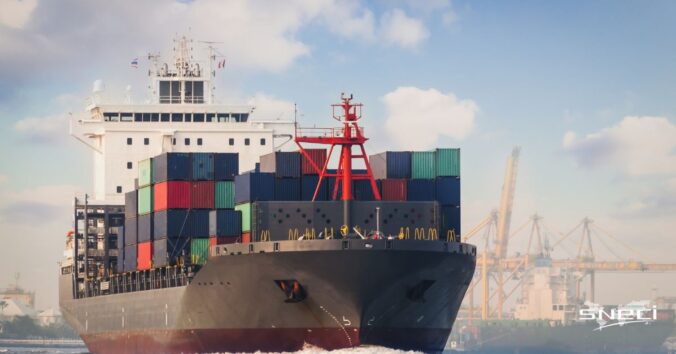Decarbonization of the Supply Chain: a European project

The decarbonization of the Supply Chain has been an increasingly important topic since 2015 when players became aware of the impact of logistics on CO2 emissions on a global scale. The amount of emissions generated by the Supply Chain has become a major concern for the various supply chain players, who have begun to define targets to be achieved by 2022-2023-2024. Today, it is possible to see whether manufacturers and other producers of industrial goods have met their commitments.
An example of a French manufacturer
Supply Chain decarbonization is a topic that has been gaining momentum since 2015 when players began to become aware of the impact of logistics on CO2 emissions on a global scale. This concern has led the various players in the supply chain to define targets for 2022-2023-2024 to reduce the amount of emissions generated by their activity.
In 2018, one of France’s leading carmakers announced its ambition to reduce CO2 emissions through its logistics. Management has set itself the target of a 5.3% reduction by 2021. The same company has also pledged to reduce its carbon footprint per vehicle worldwide by 30% by 2030 and hopes to achieve carbon neutrality in Europe by 2040 and worldwide by 2050.
But how do we get there? In concrete terms, the manufacturer is working with haulers on multimodality, favoring rail transport over road transport. The use of trains between Eastern Europe and France has prevented the emission of 2,600 tonnes of CO2. The manufacturer is also working to reduce the number of kilometers traveled per cubic meter by developing digital tools to visualize trucks in 3D and increase their loading rate, thus avoiding the emission of 12,200 tons of CO2.
Another important lever for decarbonization is packaging, which optimizes the number of parts per package. This initiative has prevented the emission of 8,800 tonnes of CO2. At the same time, the automaker is bringing its suppliers and manufacturing sites closer together to reduce the number of kilometers traveled per cubic meter of goods.
Intending to decarbonize its logistics, the automaker’s network of transporters fills in their average consumption and CO2 reduction commitments in an ECO2 questionnaire, and the Supply Chain department then analyzes their environmental performance. The results of these efforts are significant: 5,700 tonnes of CO2 have been avoided.
Avenues for reflection about decarbonization
All Supply Chain players are aware of their key role in decarbonizing the sector, to help reduce greenhouse gas emissions. So, what are the prospects and levers of action available to achieve this?
Transport plays a major role in the global energy transition like all economic sectors. Whether for private travel or the transport of goods, it accounts for around 30% of GHG emissions in France (according to the French Ministry of the Environment). Road vehicles, such as trucks, coaches, and buses, account for 22% of transport sector emissions. Decarbonizing the supply chain is therefore a crucial factor in reducing the environmental impact of these emissions. This is a strong expectation on the part of both public authorities and consumers, who are increasingly inclined to make responsible purchases.
There are many ways to reduce CO2 emissions in the supply chain. First of all, it is possible to rely on more efficient and less polluting logistics by using more environmentally friendly modes of transport, such as rail or sea. The development of digital solutions can also enable better management of flows and optimization of truck loading capacity, thus reducing the number of trips required. The rationalization of packaging and the implementation of eco-responsible packaging solutions also help to reduce environmental impact.
Reducing our carbon footprint also means using cleaner fuels, such as biofuels, or adopting electric or hybrid vehicles. The use of alternative modes of transport, such as bicycles, can also be envisaged for deliveries in city centers or dense urban areas.
Last but not least, raising awareness and training Supply Chain staff on environmental issues is an essential lever for encouraging the adoption of more responsible practices and the implementation of innovative solutions to decarbonize the Supply Chain.
HELPING DECARBONIZATION IN TRANSPORT SECTOR
Decarbonizing the transport sector is essential to help reduce greenhouse gas emissions. Supply chain players must therefore commit to this trend by adopting more environmentally-friendly practices. In France, freight transport accounts for around 30% of GHG emissions, 22% of which are generated by road transport.
To achieve 100% carbon neutrality, it is crucial to improve the energy efficiency of vehicles. This means phasing out diesel engines and adopting alternative solutions such as electric vehicles for city deliveries or short distances, as well as using biofuels.
Several avenues are being explored to achieve this goal, including direct electrification with overhead catenary and battery-powered vehicles, fuel cell electric vehicles running on hydrogen, and internal combustion engine vehicles powered by liquid or gaseous electrofuels.
However, the adoption of measures to improve the energy efficiency of trucks has been limited in recent years. Indeed, according to a study by Transport & Environment, the average fuel consumption of an average new tractor has stagnated at around 33 liters/100 km for over ten years. Supply chain players therefore need to step up their efforts to reduce the environmental impact of freight transport.
IMPROVING COMPANIES’ OVERALL LOGISTICS EFFICIENCY.
The aim of the transition to greener logistics is twofold: to move more goods while reducing the number of trucks on French roads. To achieve this, it is necessary to optimize freight logistics by making the best use of existing vehicle capacity. Although the proportion of empty freight has fallen from 25% in 1998 to 18% in 2017, there is still considerable room for improvement.
However, it is essential to avoid over-complexifying supply chains and over-intensifying transport. Cargo pooling and the optimization of loading and flooring are interesting avenues to explore to help reduce greenhouse gas emissions. In addition, it is important to give priority to the most environmentally friendly modes of transport, such as rail and inland waterways, wherever possible.
CONTRIBUTING TO MODAL SHIFT
To reduce the number of trucks on French roads while transporting more goods, it is necessary to optimize freight logistics by making better use of existing vehicle capacity. Although the proportion of empty freight has already fallen from 25% in 1998 to 18% in 2017, there is still considerable room for improvement. To achieve this, it is important to avoid overcomplicating supply chains and to reduce transport intensity by pooling cargo and optimizing loading and floor loading.
As road transport is the most energy-intensive, it is possible to divert certain flows to rail or river transport, which emit less CO2. However, the quantity of goods transported by rail in France has fallen sharply, from 57.7% in 2000 to 33.4 billion km in 2017, a 42% reduction in volume since the turn of the century, according to Transport & Environment. As a result, diesel-powered trucks should gradually be replaced by rail transport, since they fulfill the same mission. Rail transport is also a more economical solution, particularly for shipments over 500 km, while contributing to the development of Low Emission Zones (LEZ).
Switching to inland waterways also offloads road freight, generating less air pollution, greater safety, and potential savings. However, this mode of transport has several disadvantages, particularly in terms of time, flexibility, and geographical coverage. Existing waterways have to be constantly dredged, and facilities operated and maintained. Nevertheless, as part of the French Mobility Orientation Act (LOM), the French government has undertaken to draw up a strategy for the development of rail freight.
THE DIFFICULTIES ENCOUNTERED
“43% of European haulers are unable to measure their CO2 emissions”. Road haulage accounts for around 19% of transport-related CO2 emissions in Europe. Yet 43% of European haulers are unable to measure their environmental impact, and 60% of small haulers consider that environmental efforts have little or no commercial benefit. How can we make progress toward a more sustainable supply chain if so many carriers cannot accurately measure or adjust their environmental impact?
The difficulties often lie in the reliability of new technologies. Players need performance and efficiency. According to a study published by Transporeon, which aimed to identify the criteria for selecting carriers:
Cost reduction potential is the most important criterion, with a high margin, reflecting competitive conditions and low profit margins in the industry.
Customer demand is the second-highest rated criterion, and the most important among external factors, well ahead of legislation at the European or national level and public opinion.
Vehicle manufacturers (OEMs) were considered the third most important factor.
SNECI and support for decarbonization
With over 70 years of experience and 10 subsidiaries abroad, we support companies in their international growth through agile and local technical and commercial expertise.
As an expert in the internationalization of French and foreign companies, SNECI supports companies in their export growth through various services. Since 2019, we have had our own office SNECI South East Asia based in Kuala Lumpur to be closer to our customers and to support companies internationally especially those who produce or supply themselves in ASEAN.
Our various solutions in business development and industrial performance at the international level allow us to support suppliers and manufacturers in different fields of expertise.
If you would like our team of over 70 years of experience in the automotive industry, with 450 experts worldwide, please contact Laura by email at info@sneci.com or directly via the contact tab on our website.





